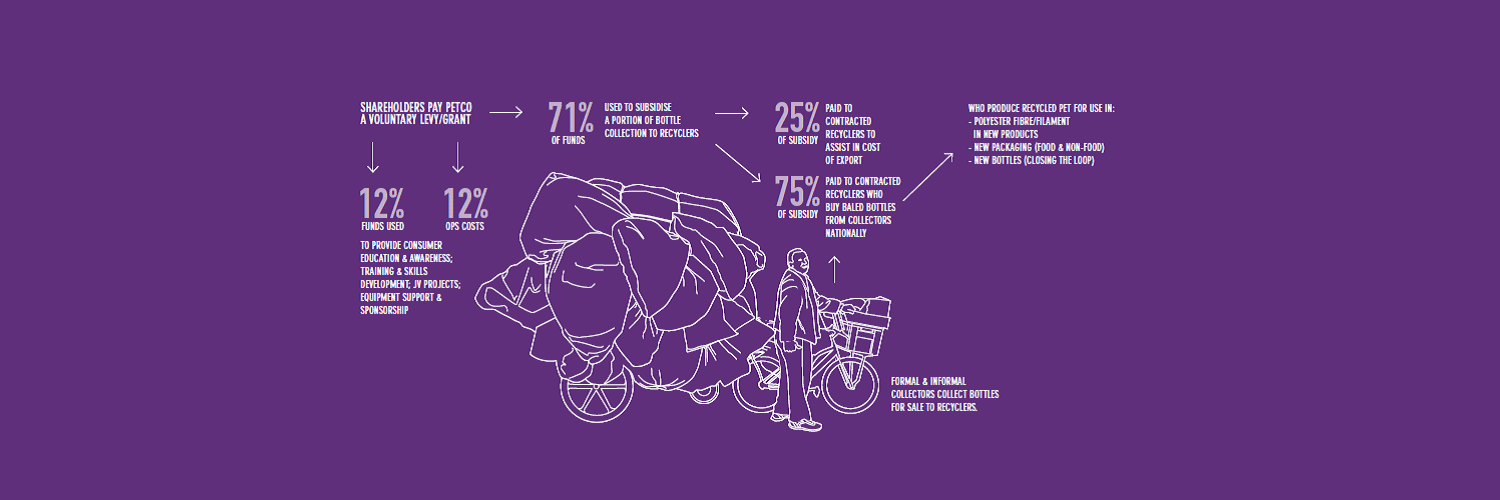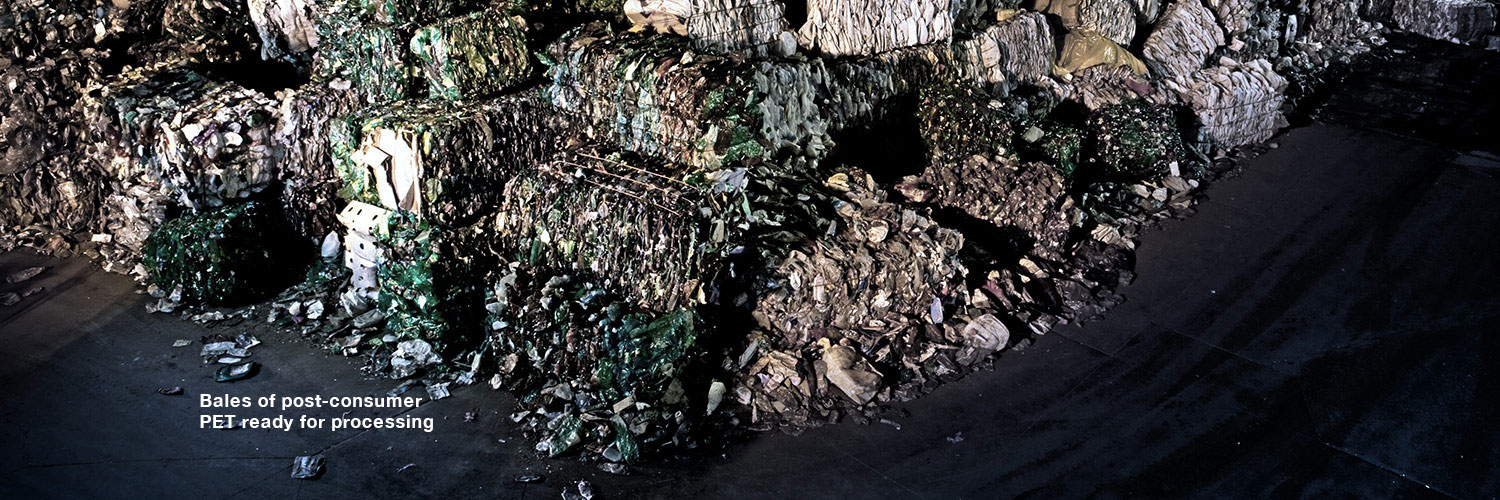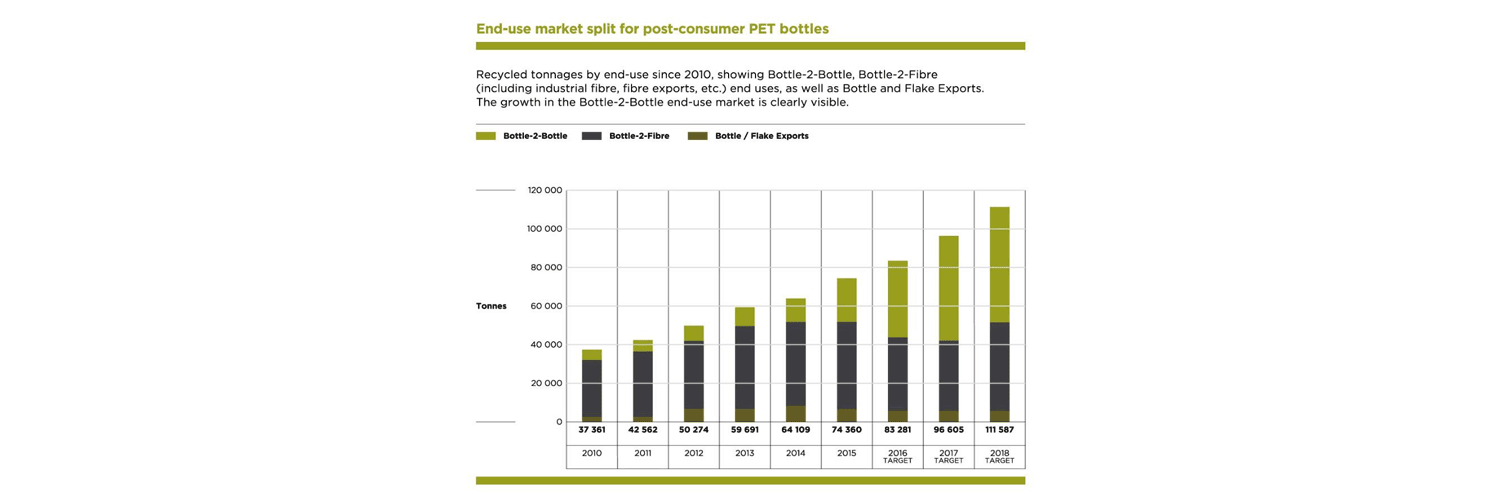Since the recycling of PET (as with many other waste streams) always competes with, for example, the price of virgin materials, economic support through incentives or subsidies is often required to sustain the end-use, demand-side market. Currently these incentives are provided by PETCO Kenya through the voluntary EPR fee collected from manufacturers and importers of PET raw material.
The key to sustaining supply with demand is to ensure that the value chain remains viable, especially during periods of low commodity prices, which are largely influenced by the volatile economic market, oil price, the highs and lows of virgin polymer and staple fibre prices, and other competing textiles. A viable supply chain attracts further investment in demand capacity, which in turns spurs the development of supply capacity. PETCO Kenya incentivizes PET recyclers who collect bottles and process them into rPET in preparation for the manufacture of new products. This is necessary to support recyclers during these adverse cycles to ensure long-term viability of projects. As part of our strategy, we continue to focus on stimulating investment in infrastructure and innovation in the development of new end markets for rPET, as well as the stimulation of existing markets. We are positive about the fostering of innovation, as well as closing the gap between research and business development and look forward to realising the vision of the Waste Research, Development and Innovation Roadmap for Kenya.
We invest all our funds in ensuring and encouraging visible recycling through:
Here is how it’s done:

Around 70-80% of our annual budget is spent on financially supporting our recycling projects to ensure that we achieve our annual volume targets. We do this so that we can sustain the interest in PET bottle recycling capacity, develop the end-use markets, and reduce the volume of post-consumer PET in the waste stream.
Our support is in the form of a recycling fee, which is paid to our recycling partners for every kilogram of post-consumer PET that they buy from collectors – this ensures that the only way they can receive financial support from us is through consistently buying post-consumer bottles and re-processing them into new feedstock material.
The level of support we give to our projects depends on a number of things, and we carefully monitor these to make sure that the funds are always spent in the most efficient manner.
Projects are also independently audited on a quarterly basis to ensure that all checks and balances remain in place.
Image below:
Bales of post-consumer PET ready for processing.

Between 70 and 80% of the PETCO budget is spent assisting volume driven projects that support recyclers who have an end-use market in their value chain.
Our volume driven project partners are the investors in new plants and equipment that is required to deliver the tonnes of PET recycled each year. They support collection through training, equipment and access. They invest in testing equipment, quality control, and the development of new end-use markets.
PETCO provides funding in support of these partners to ensure that their volume targets are met and that, through adverse economic cycles, these programmes are sustained. Our contracts with the recyclers give them the confidence to also invest downstream – in collector training, provision of baling machines and support of SMME’s.
PETCO closely monitors the market prices and major cost variables in its on-going assessment of recycling fees, and adjusts these accordingly to ensure no over-subsidy occurs and that its partners do not stall against the odds so often stacked up against those involved in recycling activities.
In order to ensure that funds are distributed as efficiently as possible, mechanisms follow market dynamics closely and automatically determine the level of financial assistance to be provided to a particular end-use.
The cost of the PETCO model to the consumer currently averages at approximately 1 cent per bottle, an amazing achievement by any standard.
PETCO is currently assisting PET flakers in Kenya to build their collection capacity, these include;
Collectively these contracted partners purchase significant post-consumer PET bottles with their footprint growing all the time.
Image below:
Mpact’s state of the art Bottle-2-Bottle facility.

PETCO embraces partnerships and sees the value of collaborative efforts. We undertake a range of projects, from in-kind donations and joint-cause marketing campaigns, to joint ventures with government, other industry bodies, and our shareholder members.
A balance must be maintained between the collection of post-consumer PET bottles on the one hand, and the demand for recycled end-use products on the other. This balance between supply and demand, and installed recycling capacity is critical to keeping the bottle collection and recycling chain intact and to ensuring that the financial benefits continue to reach collectors on the ground. In Kenya, post-consumer PET bottles are collected and recycled into two types of end-use products for the local and export market:
The largest end-use market for post-consumer PET bottles in Kenya which will be developed will initially be the polyester staple fibre market. All PET Flakes currently being exported to India, USA, the United Kingdom and Ireland are used to manufacture polyester staple fibre. Polyester staple fibre/filament is used to manufacture apparel (clothing), home textiles (duvets, pillows and carpeting), automotive components (carpets, sound insulation, boot linings and seat covers) as well as industrial applications (geotextiles and insulation).
A global growing end-use market is that of recycling bottles back into packaging. This can, to some degree, be ascribed to the growth in acceptance on the part of many companies of the concept of Extended Producer Responsibility (EPR), as well as the possibility for savings and reputational benefits associated with the use of recycled materials. The use of recycled resin in food-grade PET packaging entails compliance with extremely stringent standards for health and safety and product quality.
Non-food-grade recycled PET is therefore often applied as an input material in the manufacture of packaging and bottles for personal, homecare, pharmaceutical and other uses.
PETCO anticipates future growth in Kenya’s end-use markets for recycled PET in the Bottle-to-Bottle market, particularly as the awareness grows amongst brand owners of the benefits that can be achieved through the use of recycled PET products. In this regard, we anticipate opportunities for investment in Bottle-to-Bottle recycling facilities in Kenya in the coming years.

PETCO anticipates that the majority of the future growth in South Africa’s end-use markets for recycled PET will come from the Bottle-to-Bottle market, particularly as the awareness grows amongst brand owners of the benefits that can be achieved through the use of recycled PET products. In this regard, we anticipate significant opportunities for investment in Bottle-to-Bottle recycling facilities in South Africa in the coming years.
PETCO hopes to host nation-wide member workshops, specifically designed to be useful to members’ businesses and of benefit to their employees. These workshops will help to ensure that members are up to date with the latest offerings from government and the private sector. They will be packed with relevant case studies, and information on a range of topics relating to PET plastic recycling and relevant new products.